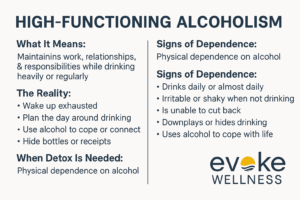You get up for work every morning. You keep your deadlines. The bills are paid, the kids are fed, and no one is staging an intervention in your living room. On paper, you’re fine. But deep down, you know you’re not.
Maybe you’ve Googled “high-functioning alcoholic” at 2 a.m. after another night you swore would be your last. Maybe you’ve wondered how bad it has to get before you’re “really” in trouble. The truth? If you’re already wondering, you’re closer than you think. And an alcohol detox center might be the first safe step out.
What High-Functioning Alcoholism Really Means
“High-functioning alcoholic” isn’t a formal diagnosis—it’s a way to describe someone who manages to keep up with work, relationships, and responsibilities while drinking heavily or regularly enough to be dependent.
High-functioning doesn’t mean healthy. It means you’ve found ways to keep the appearance of control while the damage works under the surface. You might:
- Wake up exhausted no matter how much you sleep
- Plan your day around when you can drink without raising suspicion
- Use alcohol to relax, connect, or simply get through your routine
- Hide bottles or receipts from loved ones
You may not be missing work, but you’re missing pieces of yourself—energy, clarity, joy.
The Illusion of Control
The ability to “keep it together” can actually be a trap. It creates a buffer between you and the visible consequences that would push others to get help sooner.
You might tell yourself, “I can’t have a problem—I’m still doing fine.” But that illusion can delay action until the physical dependence is strong enough that stopping on your own is dangerous.
By the time cracks show to others—missed meetings, strained relationships, declining health—the withdrawal risk may be high. And that’s where a medically supervised detox can make all the difference.
Why an Alcohol Detox Center Might Be Your First Step Out
If your body has grown dependent on alcohol, withdrawal isn’t just unpleasant—it can be life-threatening. Symptoms can include severe anxiety, shaking, nausea, hallucinations, seizures, and a dangerous condition called delirium tremens.
An alcohol detox center provides:
- Medical monitoring 24/7 to manage symptoms safely
- Medications to ease discomfort and reduce risks
- Supportive care so you’re not battling through alone
- Transition planning into ongoing treatment so detox is the start, not the end
At Evoke Wellness TX in San Marcos, we’ve helped clients who look “fine” to everyone else but are fighting a private battle they can’t win alone. Detox gives them a safe pause from the cycle, a chance to breathe, and the clarity to choose the next step.
The “Not Bad Enough” Myth
One of the most dangerous thoughts for high-functioning alcoholics is: “I’m not bad enough to need help.”
Waiting for some mythical “rock bottom” is a gamble. You don’t have to lose your job, your home, or your family to deserve help. You don’t have to hit the wall at 90 miles an hour before you decide to slow down.
Think of it like fixing a roof—you can wait until it collapses, or you can patch the leak before it ruins everything underneath.
Signs You Might Be High-Functioning but Dependent
You might be in this category if:
- You drink daily or almost daily, even if it’s “just a few”
- You feel irritable or shaky when you can’t drink
- You’ve tried to cut back and found it harder than expected
- You hide or downplay your drinking to others
- You drink to cope with stress, sadness, or social situations
Recognizing these patterns isn’t about labeling yourself—it’s about deciding whether you want something different.
What Happens After Detox
Detox addresses the physical dependence, but it doesn’t rewrite the habits or thought patterns that keep you tied to alcohol. That’s why most people transition immediately into structured care, such as:
- Inpatient rehab for full-time treatment in a supportive environment
- Partial hospitalization programs (PHP) for full-day therapy without overnight stays
- Intensive outpatient programs (IOP) that fit around work and family responsibilities
At Evoke Wellness TX, we help clients build a bridge from detox to the right next step, so they leave with a plan—not just clean bloodwork.
The Truth About Going Back to “Normal”
Some high-functioning drinkers want to detox just to “reset” so they can drink moderately afterward. While this is a common thought, the reality is that physical dependence changes brain chemistry. For many people, moderation becomes an ongoing struggle or a quick slide back into old patterns.
That’s why detox is best followed by therapy, peer support, and lifestyle changes—not just a return to business as usual.
A Story We Hear Often
“I thought I had it under control. I never missed work. My kids didn’t see me drunk. But my whole life revolved around when I could have my next drink without anyone noticing. I didn’t realize how heavy it all was until detox lifted it—even just for a few days. That’s when I knew I couldn’t go back.”
– Former Client, 2024
FAQs About High-Functioning Alcoholism and Detox
1. Can I go through withdrawal at home if I’m “high-functioning”?
Even if you feel physically strong, withdrawal can turn dangerous quickly. A medically supervised detox is the safest way to stop drinking.
2. How long does detox take?
For most, alcohol detox lasts 3–7 days. The exact timeline depends on your drinking patterns, overall health, and how your body responds.
3. Will anyone at work know if I go to detox?
Treatment is confidential. Many programs can work with your schedule or provide documentation for medical leave if needed.
4. Do I have to go to rehab after detox?
It’s strongly recommended. Detox prepares your body, but rehab addresses the underlying reasons you drink, which is essential for lasting change.
5. How do I know if I’m “bad enough” to need detox?
If you’ve tried to cut back and experienced withdrawal symptoms—or you can’t imagine getting through the day without drinking—it’s worth speaking with a professional.
6. Does Evoke Wellness TX work with high-functioning professionals?
Yes. We regularly help clients who are balancing careers, families, and responsibilities. We offer discreet, compassionate care in San Marcos, Texas.
Final Thought
You don’t have to lose everything to save yourself. High-functioning alcoholism is still alcoholism—and it’s still stealing from you, even if no one else sees it yet. Detox isn’t a punishment. It’s a safe reset button, giving you a chance to choose something better.
Call (888)450-2285 or visit our alcohol detox center services in San Marcos, Texas to start your first safe step toward change.



